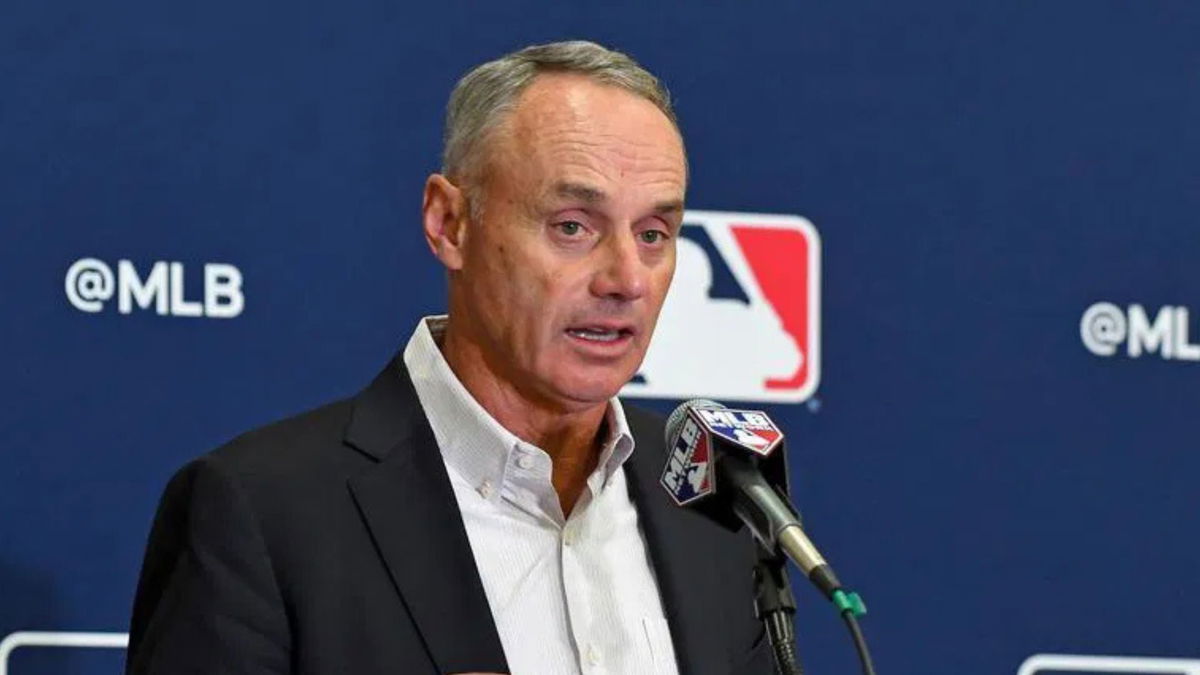
Imago
Image: IMAGO

Imago
Image: IMAGO
Major League Baseball is stuck in a time capsule! At least it seems so, given even sports like UFC seem to be making major changes, but when it comes to “America’s pastime,” it’s radio silence. And even that tag is seemingly not relevant, given that America might just have moved on from its past time. At least, that’s what the ratings say when you compare MLB to the NFL or the NBA. Now, moreover, UFC did what baseball fans have been screaming for ages!
Watch What’s Trending Now!
In a single move, Dana White’s empire signed an eye-watering $7.7 billion deal with CBS and Paramount+ and scrapped the pay-per-view model. Meaning all its content will be under one subscription service. So fans no longer have to ask, “Where can I watch?” And believe it or not, not having to think extra long and hard can be the dealbreaker when it comes to viewership. And in a world where money matters, the attention span is shorter, and no one wants to keep switching channels to watch a single game, MLB struggles to keep up. Meanwhile, UFC just nailed the code.
ADVERTISEMENT
UFC’s $7.7B CBS Breakthrough: How It Changed the Sport
A $7.7 billion deal that averages $1.1 billion annually is what UFC cracked. Starting from 2026, UFC fans no longer need to shell out $79.99 for a pay-per-view fight. In fact, every UFC event, from the marquee ones to the 30 annual Fight Nights, will be included in the basic subscription of Paramount+. Dana White, in the statement, mentioned, “This historic deal with Paramount and CBS is incredible for UFC fans and our athletes. For the first time ever, fans in the US will have access to all UFC content without a pay-per-view model, making it more affordable and accessible to view the greatest fights on a massive platform. This deal puts UFC amongst the biggest sports in the world. The exposure provided by Paramount and CBS networks under this new structure is a huge win for our athletes and anyone who watches and loves this sport.”
This shows intent, and that if a league wanted to, they would find a way. Where there is a will, there is a way, remember? Because UFC also relied for decades on the pay-per-view model. That system for sure created an exclusivity, but it also removed the casual fans from the picture. To watch a fight like McGregor vs. Khabib, for example, fans needed to shell out for an ESPN+ subscription plus $80 more. Now this UFC deal makes it mainstream. CBS will also broadcast massive bouts directly to the living rooms without any paywall barrier. Don’t mistake it as just a media rights deal; it’s a philosophical deal too. They just traded exclusivity for reach, and it’s what MLB needs to do instead of being timid.
Top Stories
Phillies to Lose $20M for Kicking 2X All Star & Silver Slugger Out of Philadelphia Clubhouse

Kevin Gausman’s Blue Jays Exit Appears Imminent as Ross Atkins Faces Framber Valdez Pressure

Yankees’ Reluctance to “Run It Back” Comments Backfires as Brian Cashman’s Challenge Collapses: MLB Prediction

Jeff Hoffman Hit With Bitter Snub as Blue Jays Told to Chase Dodgers’ World Series Champion

Bo Bichette’s Absence Won’t Hurt Blue Jays as Problematic Prediction Misses Reality, per Insider

ADVERTISEMENT
MLB’s Diversification Problem: Audience Divide
Major League Baseball has issues, and they are not just about the distribution; it’s also about who is watching. The sport has an audience divide like no other, and the numbers back it up. The All-Star Game, for example, once pulled in over 36 million viewers. The year was 1976. This year, the number is just 7.2 million, and it hasn’t cracked the 10 million mark in nearly a decade. To put into context how much things have changed, even the archrivals’ matchups, Boston and the Yankees, barely touch 3 million on FOX’s Baseball Night in America.
There is also a demographic split. MLB’s core audience is mostly male and older. And sure, casual and potential new fans are there—all thanks to new avenues. From the Netflix series to global stars like Shohei Ohtani, fans are coming up. But then again, where do they watch games? The younger fans are casual and rarely watch nightly games. And there is the regional sports network that’s crumbling, the ESPN deal that’s still not finalized, and fans still spread out between Apple TV, Amazon, Peacock, and ESPN. Now, MLB and ESPN broke up recently, and there were plenty of talks about others coming in, but according to the reports, a patch-up seems to be in the works.
ADVERTISEMENT
MLB and ESPN’s streaming reunion?
It looks like MLB and ESPN might be willing to give it another shot. This time, though, it’s not about prime-time TV but rather about streaming. According to Athletic, both parties have reached a preliminary agreement that would make ESPN the go-to digital distributor for the out-of-market games over the next three years. Their initial deal did run through 2028, too. But what does this mean for you—the fans?
So basically, MLB.tv would fold into ESPN’s brand-new direct-to-consumer service that will be priced at around $29.99 a month. This means, finally, fans can have a one-stop streaming shop for baseball. However, there is a catch—that the out-of-market access will most likely cost extra. But it’s not just over yet. ESPN would also carry around 30 exclusive nationally televised games each season.
ADVERTISEMENT
But the Sunday Night Baseball they carried would move to a different night. Meanwhile, five teams that are under league control would have their local broadcasts run through this ESPN setup. This deal is fresh and gives fans hope, but the deal is not official yet. According to the reports, it should be a done deal by September. And in times when even UFC is giving MLB a tough time, this is the need of the hour.
How UFC Leaned Into Its Intensity, While MLB Waters Down Its Tradition
The most crucial missing aspect in MLB seems to be identity. UFC knows what it wants: a raw, intense, and unpredictable game where fighters put everything on the line. MLB, meanwhile, has lost sight of what truly makes it iconic. Baseball loves to market its brainpower, so everything is high-tech, sabermetrics, and analytics. But at the same time, they are rolling out rules that are meant to restore tradition in the game. It’s most contradictory.
ADVERTISEMENT
One-hand teams are using analytics to select the best players and maybe get the best value out of them. On the other hand, the league is forcing starting pitchers to go at least six innings, a thing that analytics itself has nearly killed. Just in the last decade, MLB has gone from not changing any roles to making 16 new ones since 2014! Pitch clocks, bigger bases, shift bans—you name it. Sure, it has made the pace better—but passion? That’s hard to say. Meanwhile, MLB is not changing the one thing they really need to change.
MLB Clinging to Inventory Volume (162 Games) → Less Leverage in Blockbuster Deals
If you need to point out one outdated model that MLB needs to change, it’s their 162-game season. The real kicker is that traditional baseball didn’t even have this many games. The schedule was expanded from 154 games to 162 games back in 1961. The reason was to accommodate expansion teams. At the time, gate receipts were the main revenue source, so more games meant more money. But today, that’s not the only way the league earns, right? Broadcasting rights, streaming deals, and more are ways that the league earns.
ADVERTISEMENT
The eight extra games add very little value in hindsight. And consider this—each team in the NFL plays 17 regular-season games, yet the league manages $9 billion annually just in broadcast deals. MLB, meanwhile, plays 162 games, yet it struggles to break in even 3 million viewers. The people don’t want volume; they want marquee moments. It’s not just fans that think the schedule is too long; even MLB players think the same.
Last season, Anthony Rendon had suggested shaving down the season. And surprisingly, several players anonymously agreed to it. Some even wished for 120-125 games. But two-thirds wanted more games; given more games, more pay. Moreover, shaving down the season to fewer games has several benefits. For example, MLB still had the games running when the Hall of Fame was going on. They can protect players from injuries and have expanded playoffs, which might interest fans more. But baseball is clinging to volume and not making changes that are really needed.
ADVERTISEMENT
MLB, Once “the National Pastime,” Now Failing to Reclaim Glory
UFC, with its new deal, embraced the new reality. But MLB is clinging to traditions and fragmented business models, which are only hiccups in them truly becoming the national sport. Moreover, they have avenues and stars to make them bigger than they are. Shohei Ohtani, Aaron Judge, and many more Dominican players are all bringing in audiences from around the world. All MLB needs is a way to keep the fans from switching over to other sports.
The World Series has plenty of appeal to pull players, but when the six months of grind loom high, the interest wanes. For now, the lack of clarity is what is stopping them from regaining the glory of the past. They are watching the NFL, NBA, and now even UFC move past and risk being remembered as the sport that has lost its way—all due to stubbornness.
ADVERTISEMENT
ADVERTISEMENT
ADVERTISEMENT